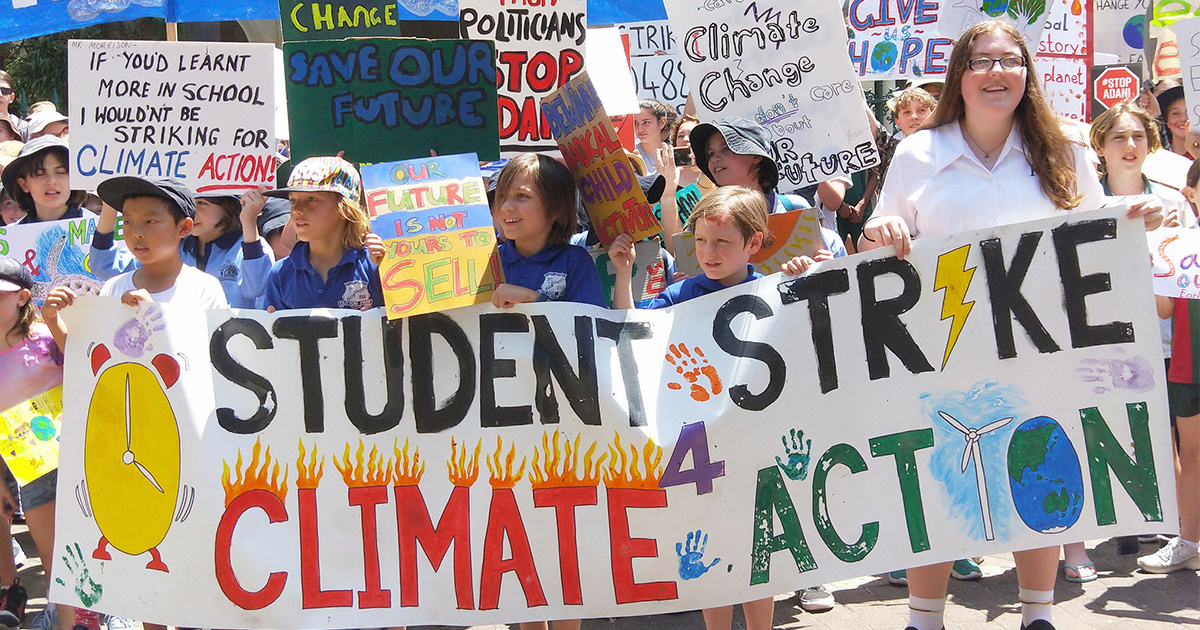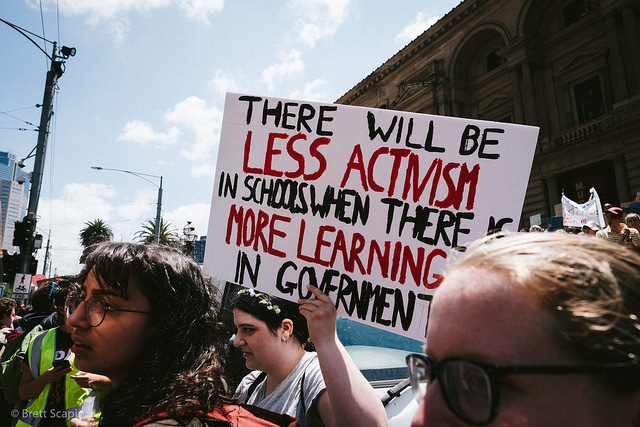
Hundreds of Thousands of Students Prepare for Global #ClimateStrike: Here Are 5 Ways You Can Help

Students striking for climate action in Brisbane, Australia on Nov. 30, 2018. Stop Adani / CC BY 2.0
In 92 countries and counting, hundreds of thousands of students are planning to skip school on March 15 as part of the “School Strike 4 Climate” — a growing movement of young people demanding that policymakers worldwide take urgent and radical steps to battle the climate crisis.
For the past several months, students around the world have joined the #FridaysForFuture school strike launched last year by Swedish teenager Greta Thunberg, whose solitary protests outside her country’s parliament — inspired by the Parkland students advocating for stricter gun laws in the U.S. — generated headlines that helped spur the global youth climate movement.
“I think we are only seeing the beginning. I think that change is on the horizon and the people will stand up for their future,” Thunberg told The Guardian about the mass mobilization planned for March 15. “It’s going to be very, very big internationally, with hundreds of thousands of children going to strike from school to say that we aren’t going to accept this any more.”
Here’s how to get involved:
- Visit FridaysForFuture.org for more information.
- Find a protest near you (U.S. protests here).
- Plan and register your own protest.
- Check out this 350.org resource page: “5 ways you can support the school climate strikes.”
- Spread support on social media with the hashtags #FridaysForFuture, #ClimateStrike, and #SchoolStrike4Climate.

Students striking for climate action in Melbourne, Australia on Nov. 30, 2018.
Stop Adani / CC BY 2.0
Although the movement has elevated public demands for coordinated global efforts to cut planet-warming emissions generated from human activity, Thunberg added: “I am not more hopeful than when I started. The emissions are increasing and that is the only thing that matters. I think that needs to be our focus. We cannot talk about anything else.”
This morning 1209 places in 92 countries… 8 countries left to make 100 by Friday! https://t.co/EFTn7eCfm6
— Greta Thunberg (@GretaThunberg) March 12, 2019
We are striking because our world leaders have yet to acknowledge, prioritize, or properly address our climate crisis,” declares a mission statement from the U.S. organizers. “We are striking because marginalized communities across our nation — especially communities of color, disabled communities, and low-income communities — are already disproportionately impacted by climate change.”
“We are striking because if the social order is disrupted by our refusal to attend school, then the system is forced to face the climate crisis and enact change,” the statement continues. “We are striking for the Green New Deal, for a fair and just transition to a 100 percent renewable economy, and for ending the creation of additional fossil fuel infrastructure.”
In addition to the Green New Deal, which Rep. Alexandria Ocasio-Cortez (D-N.Y.) and Ed Markey (D-Mass.) introduced to Congress as a resolution last month, the U.S. movement calls for declaring a national emergency, pointing to recent warnings from experts that “we have 11 years to avoid catastrophic climate change.”
The lead organizers of U.S. climate strikes are Alexandria Villaseñor, a 13-year-old from New York City; Haven Coleman, a 12-year-old from Denver, Colorado; Maddy Fernands, a 16-year-old from Edina, Minnesota; and Isra Hirsi, the 15-year-old daughter of U.S. Rep. Ilhan Omar (D-Minn.).
“My little sister is in first grade and she’s going to graduate high school in 2030, so to think that I get to have a childhood and she won’t even be able to reach adulthood [before things get worse]” @israhirsi on addressing climate change ✊🏽 https://t.co/YFXlSLNN84
— Ilhan Omar (@IlhanMN) March 8, 2019
The students’ strike has been enthusiastically supported by major environmental organizations, including the Center for Biological Diversity, Extinction Rebellion, Greenpeace, March for Science, Sierra Club, the Sunrise Movement and 350.org.
"#Dearadults, please #useyourpower". Support 100,000s of school children & students going out on #climatestrike this Friday 15 March #FridaysforFuture.
Here's 5 ways you can support: https://t.co/jPbe6cRuGk pic.twitter.com/eUep2svehM
— 350 dot org (@350) March 11, 2019
Reposted with permission from our media associate Common Dreams.

 233k
233k  41k
41k  Subscribe
Subscribe 